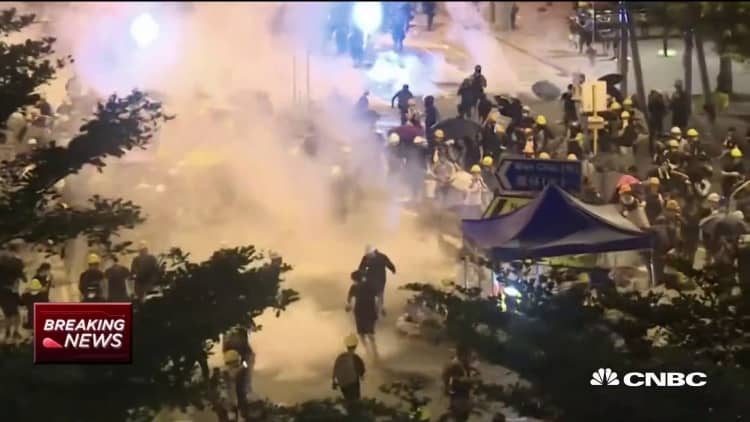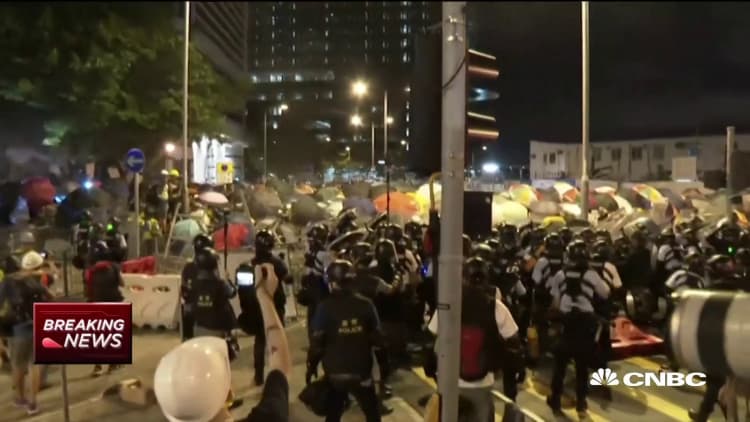
Hong Kong police in riot gear were seen firing tear gas canisters at people on the streets near the government headquarters, which had been taken by protesters after they smashed the windows and stormed the building.
NBC News reported that police climbed over barricades as they advanced on the building and fired tear gas.
Around midnight Tuesday, people were heard chanting "leave together" as they tried to evacuate the legislative chambers. Legislators Alvin Yeung and Roy Kwong confirmed to NBC News that there are no protesters inside chambers or at Legislative Council Building Demonstration Zone.
During a 4 a.m. Tuesday news conference at police headquarters, Police Chief Stephen Lo pushed back on comments that officers had abandoned the legislature, allowing protesters to take over and vandalize the building. Lo said police had been inside the building for hours, before making a "temporary retreat" around 9 p.m. He said that the officers left after they were told that all workers had been evacuated from the building.
Lo alleged that protesters had thrown white smoke into the complex and tampered with a circuit box, turning off the lights. He explained that because of those safety concerns, police had "no choice but to temporarily retreat."
Chief Executive Carrie Lam condemned the "extreme use of violence" by protesters who stormed the Legislative Council building. She drew a contrast between the events of Monday evening and the June demonstrations in the streets of Hong Kong. Lam said, "regardless of the number of participants, the march was peaceful." Lam said she hopes that the Hong Kong community agrees and condemns the storming of LegCo.
Thousands of demonstrators took to the streets Monday, the 22nd anniversary of the former British colony's handover to China.
Since the July 1 handover in 1997, citizens of Hong Kong — a Special Administrative Region of China — have been rallying every year to demand for democracy. But experts had warned this year's march might attract more people after protests, which started in early June, continued for weeks amid anger toward the government's proposed extradition bill. The controversial law would pave the way for people arrested in Hong Kong to stand trial in mainland China.
Scenes of chaos were apparent in some protest sites on Monday as thousands of pro-democracy protesters took to the streets to demonstrate against the legislation.
Police, who were on standby as the protests grew increasingly chaotic, said some 1,500 protesters had gathered near the Hong Kong government headquarters on Monday.
Reuters reported that more than 100 riot police confronted protesters, beating some with batons and using pepper spray to disperse the crowds gathered to disrupt a planned ceremony to mark the handover in 1997.
The president of Hong Kong's Legislative Council, released a statement through a spokesperson saying he "strongly condemns the violent act of charging the Legislative Council building this afternoon," according to a translation by CNBC. "Protesters pushed a steel cart and used steel bars to severely vandalize multiple parts of the Legislative Council building," the statement said.
Meanwhile, a separate group of Hong Kong protesters rallied on Sunday and Monday in support of the local police and Beijing for trying to maintain order. Police were also hurt, with local media showing that 13 police officers were burned by liquid sprayed by demonstrators.
It's a proposal, or a set of proposals, which strike a terrible blow ... against the rule of law, against Hong Kong's stability and security, against Hong Kong's position as a great international trading hub.Chris PattenHong Kong's last British governor
The Hong Kong government suspended the controversial bill on June 15, following days of protests which became one of the city's largest and most violent rally in decades.
Speaking on Monday at the flag- raising ceremony marking the anniversary of the handover, Lam finally emerged again after being accused of not being seen in public since June 18 — when she made a public apology for stoking unrest with the unpopular plan.
Public outrage over how she handled the protests, including her issued apologies through the city's spokespeople, have led to outcries for her resignation.
"The incident that happened in recent months has led to controversies and disputes between the public and the government," Lam said on Monday. "This has made me fully realize that I, as a politician, have to remind myself all the time of the need to grasp public sentiments accurately."
"After this incident, I will learn the lesson and ensure that the government's future work will be closer and more responsive to the aspirations, sentiments and opinions of the community," she added.
During the early Tuesday news conference, Lam pushed back on characterizations that her government has not responded to protester demands. She said that the government had "good reasons" for not responding to every demand, but emphasized that she had already made a "very positive response."
Lam said that the controversial extradition bill, which she suspended in June, "will likely expire or die in July 2020, when the current LegCo term expires." She also said demands to immediately release arrested protesters would "not be in accordance with the rule of law," prior to conducting proper investigations.
'Volatile' situation
"This year's anniversary is shaping up to be quite volatile due to the unresolved nature of the extradition bill," said Andrew Coflan at Eurasia Group. "While some pro-democracy forces have accepted the 'compromise' of only a partial withdrawal of the bill, others continue to fight for the full withdrawal, as well as Carrie Lam's resignation."
Lam has been criticized for mishandling the police violence against the protesters in Hong Kong and only acting on behalf of the Chinese government.
Protesters saw the proposed extradition bill as just another step by Beijing to jeopardize Hong Kong's autonomy, but the Chinese government has denied any interference.
Addressing the public, Lam said on Monday: "Every one of us in Hong Kong, though holding different views and assuming different roles, loves this place and treasures our long-cherished values. I and the (Hong Kong) government will double our efforts to restore people's confidence and get Hong Kong off to a new start."
Hong Kong has already lost much of its freedom to Beijing's encroachment.Andrew Coflananalyst at Eurasia Group
The area around Golden Bauhinia Square, where the flag-raising ceremony took place has been blocked off since Saturday to prevent protesters from gathering to disrupt it.
But protesters started setting up barricades across nearby streets as early as 4:30 a.m. local time, leading to a standoff with police blocking access to the square. They began moving toward the police as the ceremony was about to take place at 8 a.m. While officers drove back demonstrators with plastic shields, the retreating protesters pointed open umbrellas to ward off pepper spray.
Business concerns
Hong Kong has been divided between pro-democracy and pro-Beijing groups for years.
While the Chinese government has tightened its control over the city but also given the territory access to the world's largest economy.
Businesses have usually steered away from criticizing the Chinese government over any policies regarding the administration of Hong Kong, in fear of losing any economic benefits the territory currently enjoys.
Under the the Mainland and Hong Kong Closer Economic Partnership Arrangement — also known as CEPA — Hong Kong enjoys highly liberalized trade in goods and services with China and has since become the gateway to the Chinese market for many international companies.
But even pro-business groups have recently showed concern for Hong Kong's independent judiciary system.
"It's a proposal, or a set of proposals, which strike a terrible blow ... against the rule of law, against Hong Kong's stability and security, against Hong Kong's position as a great international trading hub," Hong Kong's last British governor, Chris Patten, said in June.
Coflan echoed that sentiment saying: "Hong Kong has already lost much of its freedom to Beijing's encroachment."
The momentum for Monday's protest is probably mostly because "the lack of a clear resolution to the extradition bill situation has bled over into the anniversary and will heighten tensions throughout the day," he added. "Protesters will be wary of police action, and the authorities risk escalating the situation in an attempt to control it."
As for how this might affect the mainland China government, Coflan said, "There is little direct threat from these movements to Beijing or immediate impact on mainland China."
"As a result of these protests, they will likely seek to calm tensions over the short-to-medium term, instead drawing Hong Kong closer to the mainland through increased investment and other, less headline-grabbing means."
– CNBC's Vivian Kam, Yolande Chee, Christine Wang, Reuters and NBC News contributed to this report.

Correction: This article has been revised to reflect the correct spelling of Andrew Coflan.



